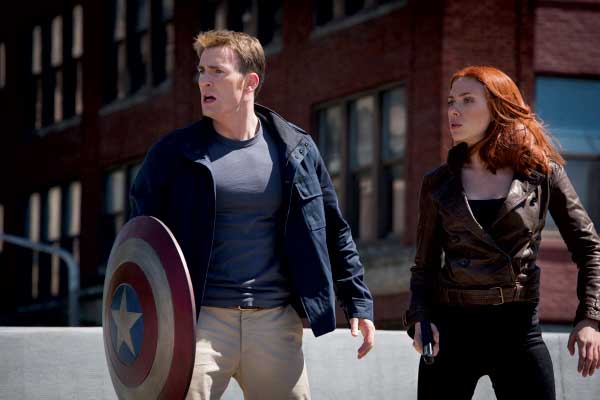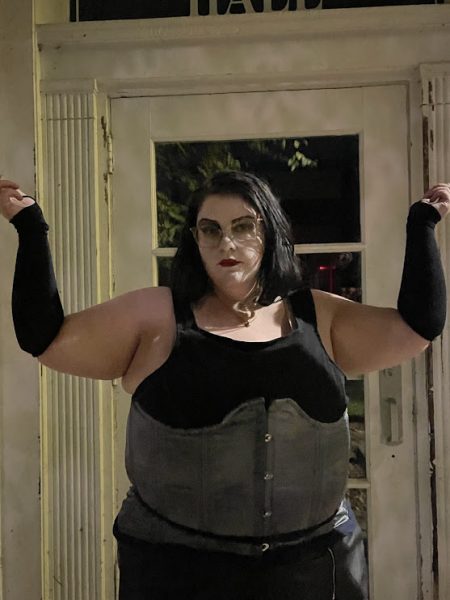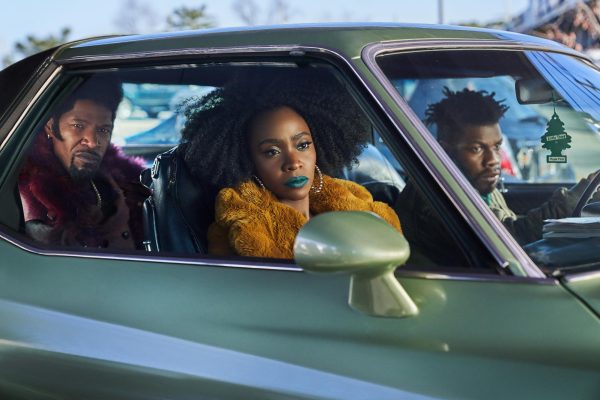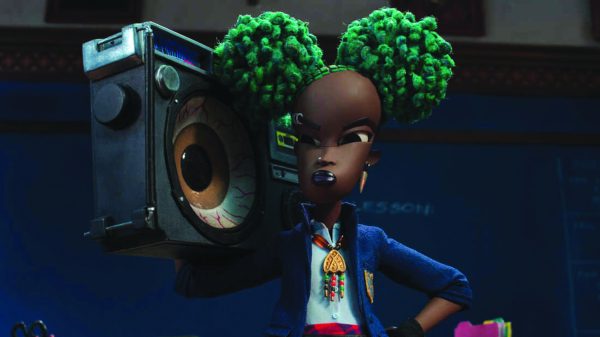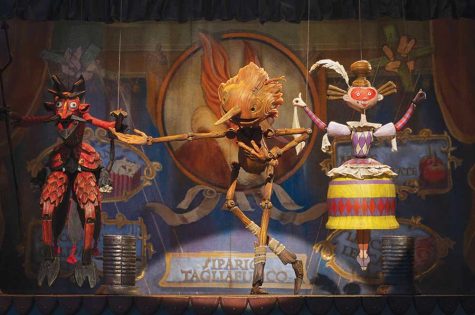“Captain America” vs. Wes Anderson
“The Grand Budapest Hotel” is “The Shining” as a humanistic comic fantasy. Both films are built on hotels. Both films center on their respective hotel’s distinctive caretakers. In director Stanley Kubrick’s “Shining,” Jack Nicholson played a homicidal version of himself, chasing his wife with an ax and scaring the bejesus out of his little boy. In director Wes Anderson’s “Grand Budapest,” Ralph Fiennes plays a flamboyantly cultured luminary of the hotel trade, chasing elderly blondes with his privates and earning the admiration of his lobby boy.
“The Shining” tries to make a point about the immortality of evil. “The Grand Budapest Hotel” tries to make no point at all, and yet it’s the better film. It’s a celebration of motion pictures’ unique storytelling powers – via Wes Anderson’s imagination, a stronger point that anything Kubrick strangled out of “The Shining.” As “The Shining” author Stephen King said, that was “a film by a man who thinks too much and feels too little;” but thought and feeling seem to be mutually exclusive for the man behind “The Grand Budapest,” and the result is intoxicating.
Intoxicating as a bottle of 1932 merlot – 1932, the year in which most of this film takes place. The story unravels like a P. G. Wodehouse yarn. Fiennes is concierge at the Grand Budapest Hotel, a luscious retreat in the fictitious Republic of Zubrowka. The hotel walls are wrapped in candy pink. Fiennes’ himself is usually wrapped in an elderly blonde, a taste he explains only as follows: “As one grows older, one must learn to appreciate the cheap cuts.”
One of those elderly blondes, played by Tilda Swinton, who’s given an uncharacteristically warm luster by the makeup mummification, is found dead. Murdered, the police believe. Fiennes is their only suspect. There goes his career as concierge, but harder still, Zubrowka is being invaded, beginning a tradition of war that will desecrate the Grand Budapest. We know this because the story is bookended by segments set in 1968, when the adult lobby boy, played then by F. Murray Abraham (who looks he deserves a “Lincoln” after his surname), tells the tale to an author, played by Jude Law.
The film dances between timelines, color schemes and aspect ratios with balletic mastery. It’s the waltz of a brilliant artist in his element. Anderson is the only current American filmmaker who appreciates the power of the 1.33:1 frame, also known as “full frame,” the framing all motion pictures used until widescreen’s invention in the 1950s. It makes the images taller; it’s fitting for this story’s scale. It reduces space and increases intimacy. Using 1.33:1 also reduces the gap we imagine between now and then; it inspires the intimacy between 1930s cinema and cinema 2014. A black & white, 1.33:1 moment on a train, apparently inspired by the beginning of “Design for Living” (1933), makes one wonder why we don’t make them like we used to.
That’s another “Grand Budapest”-“Shining” connection: their central idea is time. Kubrick didn’t explore the idea: he stated it, in plain intellectual terms, with that picture on the wall at the end of the film. But Anderson emotionally explores time. Abraham’s aged lobby boy-turned-hotel-owner recalls the passage of time with wonder and bittersweet pain, which Anderson visually denotes by dimming the lights. Abraham’s final characterization of Fiennes’ concierge is a man blissfully living in a time that had already ended.
I can’t help wondering if Anderson feels like that: a filmmaker blissfully living in an era that has already ended. Anderson’s visual creativity, his innovation and playfulness, would be right at home in the 1970s, alongside Martin Scorsese or Brian De Palma. Then audiences celebrated skill; now we prefer the more relatable, home-made amateurism of video and YouTube pictures. “The Grand Budapest Hotel” is an old man’s vision, presented with a young man’s energy. It isn’t hard to imagine that Anderson feels like the concierge – the director – in his movie: like a blissful time traveller who’s arrived too late.
Filmmakers like Wes Anderson see film as something organic. The way we write a film gives it unique thoughts. The way we put it together in post-production, the editing, the music, gives the film its own pulse. The composition of the images themselves gives each film a soul.
For those with this approach to film, coming into contact with a movie is like encountering an ethereal being, like something from “Star Trek.” It changes our perception of who we are, and how we live. It can change how we feel about life itself. Sitting in a movie theater is sitting in a church with the promise of communion with God. We have a more visceral reaction to films: a child’s wonder at great images, an adult’s reasoning about the encountered being.
The number of people with this organic view of film is decreasing. The number of people with a consumer’s approach to film is increasing; they already dwarf the organic-experience minority–hence the generally negative response to “Man of Steel,” the almost unanimous disregard for Paul W. S. Anderson’s work, the career-long dismissal of Brian De Palma.
The consumer approach to film values movies on how they fulfill expectations: films are pieces of entertainment, and each has a job to do. It’s a great medium, but they’re just movies. I write that with contempt, because it’s the opposite of my view, but neither view is better than the other. I’ve explained each so that you understand why, although “Captain America: The Winter Soldier” is good-intentioned, its success is so depressing.
The first “Captain America,” directed by Joe Johnston, was set during World War II. The sequel is set now. The them is domestic spying: if it’s a movie about anything, it’s about jingoism and the NSA. Steve Rogers (Chris Evans), a.k.a. Captain America, is struggling to recognize the America he stands for in America 2014. Nick Fury (Samuel L. Jackson), agent of S.H.I.E.L.D., is deemed dangerous, despite his patriotism, because he has a moral code. Fury is targeted by a S.H.I.E.L.D. director, played by Robert Redford, who wants to use our technology to acquire power. Natasha Romanov (Scarlett Johansson), a.k.a. “Black Widow,” believes she’s been redeeming herself, doing something good, but starts to wonder if she should have asked more questions.
The themes are relevant and the story is simple. Only once is it disgusting: when Black Widow testifies before Congress after leaking government documents exposing S.H.I.E.L.D. corruption. During the interrogation, she gets up, announces she can walk out because she’s the good guy, and they need her–and she does. This is the same kind of self-satisfying thinking that sunk “Lincoln,” that’s dividing us now as a country, and here are our heroes are doing it on the screen. They’ve made Scarlett Johansson the only difference between Black Widow and Dick Cheney.
The story–themes, political thrills, conspiracies–would be perfect for a creative writer. But this script is nothing but words on pages. Sample exchange: “You’re going after him, aren’t you?” “I’m not asking you to go. This is my fight.” Pause. “When do we leave?”
The directors never compose an image for power. It might as well be a mobile play on murky, desaturated video.
On the positive side, the cast is a visually-ingested libido-enhancer. The men could make a nun blush. Chris Evans is rife with muscular elephantitis. Sebastian Stan of “Gossip Girl,” playing the titular soldier, is the ultimate lost boy, inspiring maternal instinct before inciting natural and pleasurable bodily processes. Scarlett Johannson’s pheromones come across in 3D, and Cobie Smulders shows up, casting audience members into daydreams in which they can point to her and tell their kids how they met their mother.
“The Winter Soldier” re-packages the Marvel comic book, by hardboiled writer Ed Brubaker, as a movie, with jokes and gigantic action sequences. This is “Captain America: The Winter Soldier”’s job, and it gets done. Those with the organic approach to film will feel lost, like Captain America, wondering where the medium they stand for has vanished. But, if they’re lucky, they’ll have a boner.


